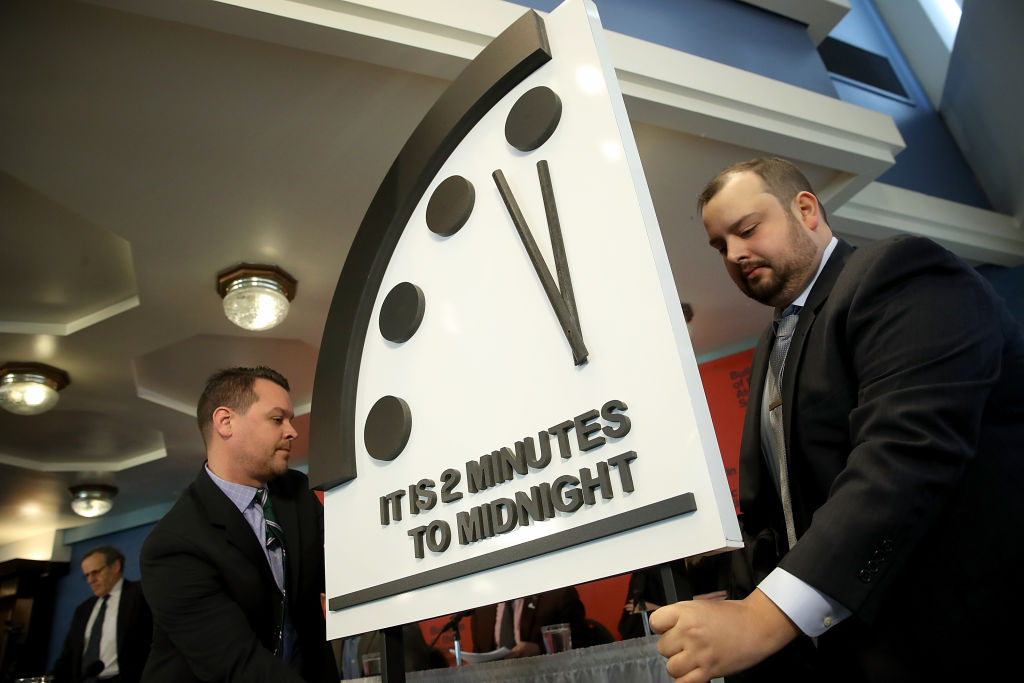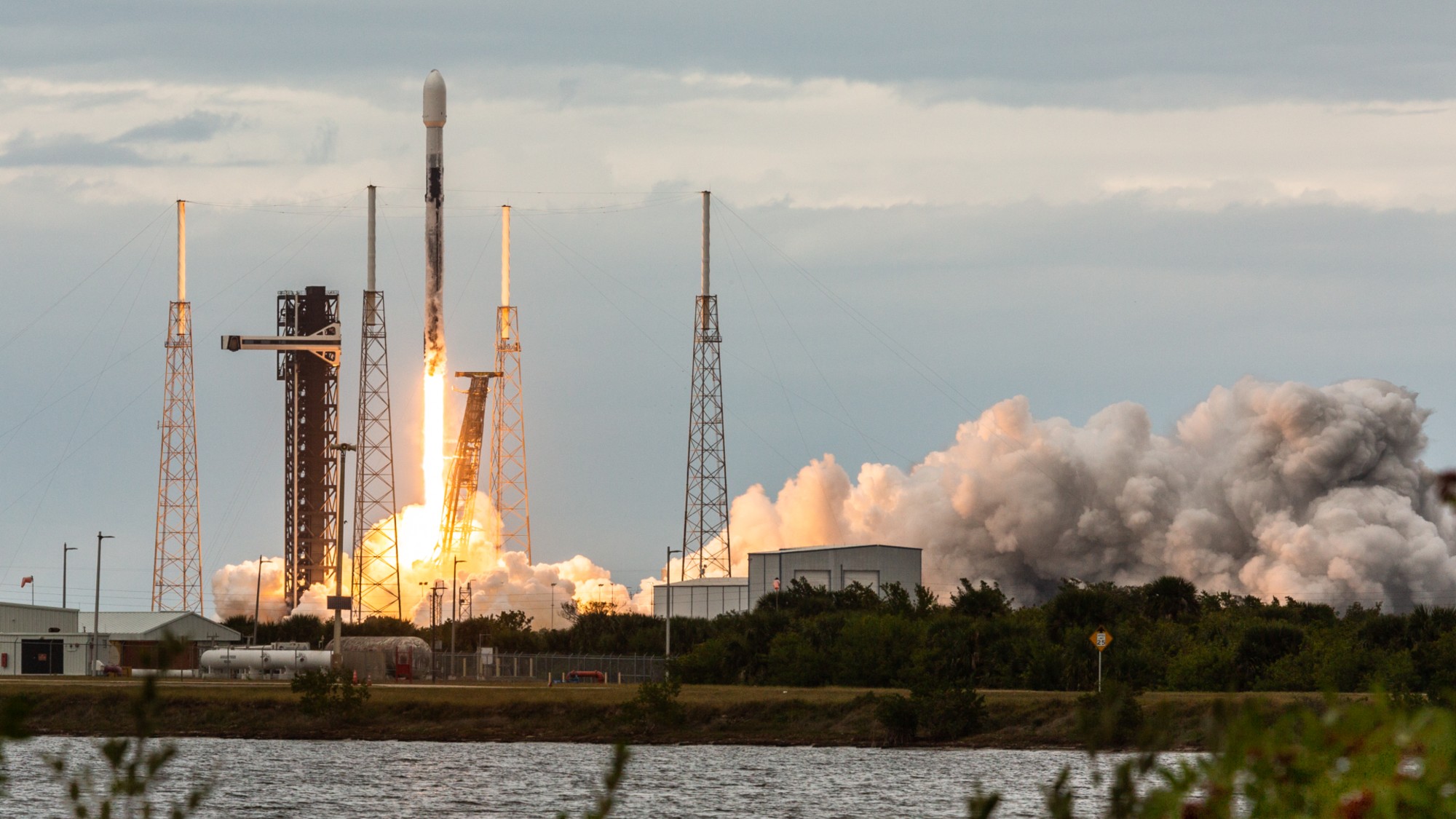The world just got closer to a nuclear doomsday, atomic scientists say


The Doomsday Clock ticked 30 seconds closer to the nuclear apocalypse on Thursday, and the Bulletin of the Atomic Scientists is once again blaming President Trump, the Chicago Tribune reports. The metaphorical clock has been used to gauge the threat of humanity's annihilation since 1947, with midnight representing the end of the world. The apocalypse is now just two minutes from midnight, reported the scientists, who consult with a board that includes 15 Nobel Laureates.
In a statement that won't help anyone sleep better at night, the Bulletin said that "the world is not only more dangerous now than it was a year ago; it is as threatening as it has been since World War II." The scientists squarely blamed Trump as well as mounting tensions with North Korea, citing "the failure of President Trump and other world leaders to deal with looming threats of nuclear war and climate change."
The clock has been as far away from midnight as 17 minutes, although last year it advanced to as close to doomsday as it's been since the United States tested its first thermonuclear device and the Soviet Union tested a hydrogen bomb in 1953. "We have members of Congress, White House advisers, and even the president implying that they think war with a nuclear state is not only likely, but potentially desirable," said nuclear weapons expert Alex Wellerstein. "That's unusual and disturbing. The question I have is: How much forward can they go?"
The Week
Escape your echo chamber. Get the facts behind the news, plus analysis from multiple perspectives.

Sign up for The Week's Free Newsletters
From our morning news briefing to a weekly Good News Newsletter, get the best of The Week delivered directly to your inbox.
From our morning news briefing to a weekly Good News Newsletter, get the best of The Week delivered directly to your inbox.
A free daily email with the biggest news stories of the day – and the best features from TheWeek.com
Jeva Lange was the executive editor at TheWeek.com. She formerly served as The Week's deputy editor and culture critic. She is also a contributor to Screen Slate, and her writing has appeared in The New York Daily News, The Awl, Vice, and Gothamist, among other publications. Jeva lives in New York City. Follow her on Twitter.
-
 A running list of the US government figures Donald Trump has pardoned
A running list of the US government figures Donald Trump has pardonedin depth Clearing the slate for his favorite elected officials
-
 Ski town strikers fight rising cost of living
Ski town strikers fight rising cost of livingThe Explainer Telluride is the latest ski resort experiencing an instructor strike
-
 ‘Space is one of the few areas of bipartisan agreement in Washington’
‘Space is one of the few areas of bipartisan agreement in Washington’Instant Opinion Opinion, comment and editorials of the day
-
 British warship repels 'largest Houthi attack to date' in the Red Sea
British warship repels 'largest Houthi attack to date' in the Red SeaSpeed read Western allies warn of military response to Iranian-backed Yemeni rebels if attacks on ships continue
-
 Houthi rebels claim Red Sea ship attacks
Houthi rebels claim Red Sea ship attacksspeed read Iran-backed Yemeni group vows to escalate aggression towards Israel-linked vessels in revenge for Gaza war
-
 Israel plans next phase of Gaza war as first hostages released
Israel plans next phase of Gaza war as first hostages releasedSpeed read After four-day ceasefire 'we will not stop' until destruction of Hamas, says Israel
-
 Mob storms Russian airport 'looking for Jews'
Mob storms Russian airport 'looking for Jews'Speed Read Plane from Israel surrounded by rioters chanting antisemitic slogans after landing in Russia's Dagestan region
-
 Tuberville's military promotions block is upending lives, combat readiness, 3 military branch chiefs say
Tuberville's military promotions block is upending lives, combat readiness, 3 military branch chiefs saySpeed Read
-
 Ukraine's counteroffensive is making incremental gains. Does it matter in the broader war?
Ukraine's counteroffensive is making incremental gains. Does it matter in the broader war?Speed Read
-
 US commissions first-ever Navy ship in a foreign port
US commissions first-ever Navy ship in a foreign portSpeed Read
-
 British spy chief, Wagner video suggest Prigozhin is alive and freely 'floating around'
British spy chief, Wagner video suggest Prigozhin is alive and freely 'floating around'Speed Read
